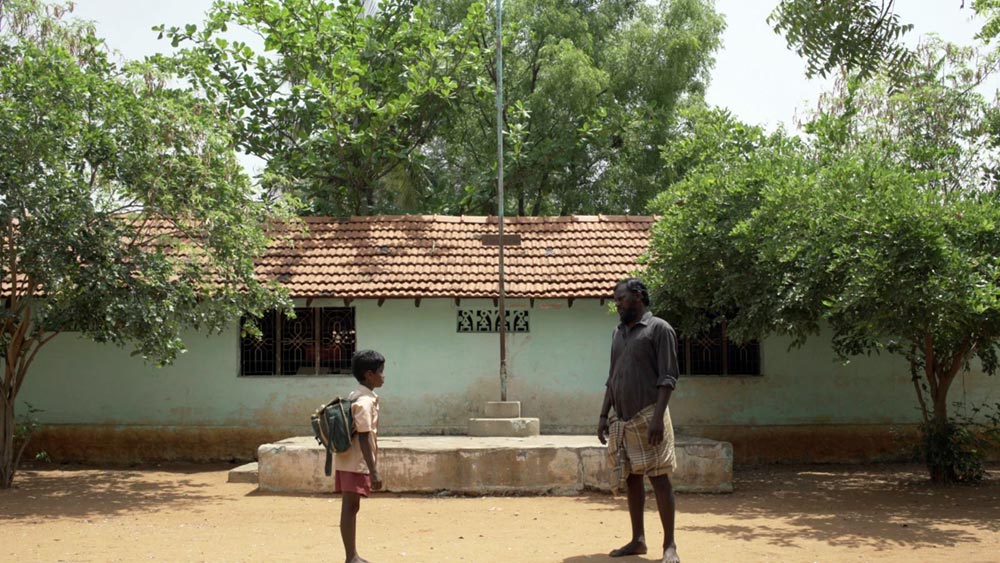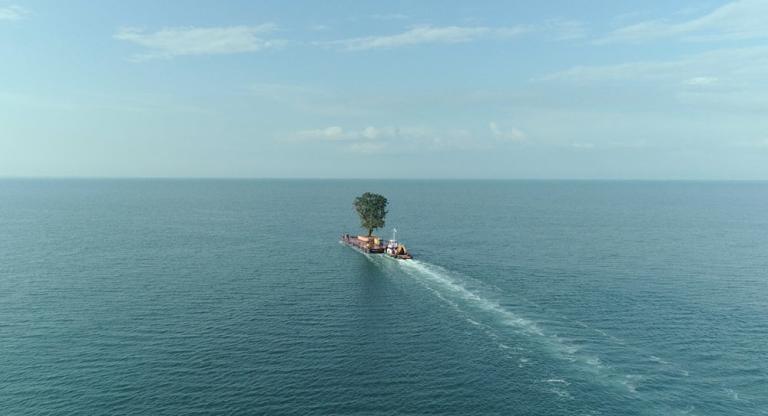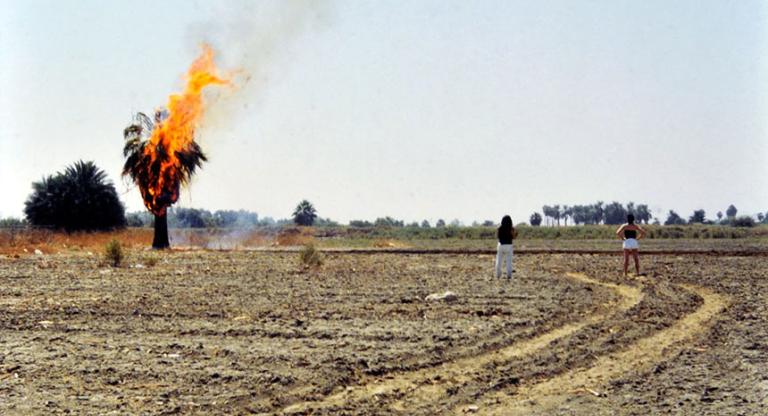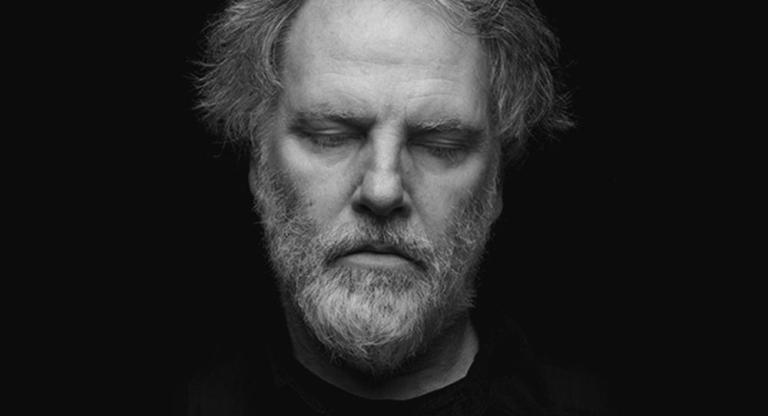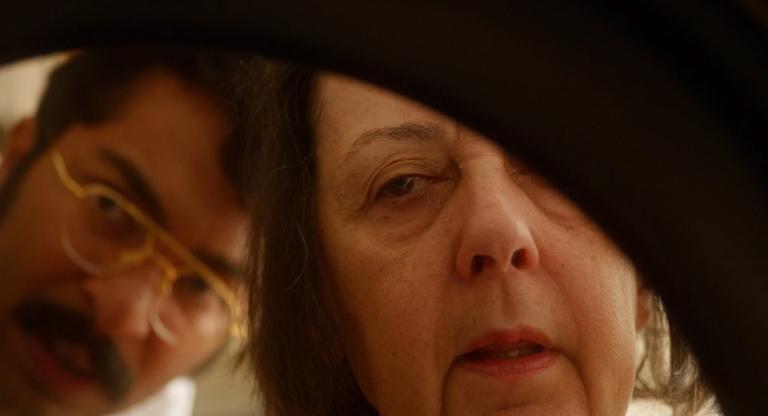It’s a film that starts at a furious walk and barely lets up: an ornery father yanks his son out of school and more or less frog-marches him to the village where his mother lives. In P.S. Vinothraj’s Pebbles, barren lands in Madurai in Tamil Nadu serve as the unforgiving backdrop for the father-son trip, by bus and by foot, never with ease. And when I finished watching the film’s 70-odd minutes in January, I knew I had to speak with the director of this refreshingly compact and energetic work, which won Rotterdam’s Tiger Award for best film after its world premiere (only the second Indian film to do so, following 2017’s Sexy Durga). Vinothraj did not disappoint, explaining how he set this battle of wills against a backdrop of drought and poverty, grounded it in unforgettable local detail and a strong pictorial sense that never has to choose between realism and lyricism. Freely switching up between stark panoramas and Alan Clarke-like walking shots, Pebbles has an unflagging life-force and grim but sure sense of humor, keying into the monstrous yet riveting father character, Ganapathy (played by a theater actor, Karuththadaiyaan), while recognizing the defiant strength in his son, Velu (Chellapandi), and the independent trajectories of others whose paths they cross. Fleshing out the portrayal are a roadside family catching rats for dinner, a woman carrying water jugs helped onto a bus by a stranger, and a man driven by his wife on a scooter. Inspired by Vinothraj’s recollections of his own sister’s abuse and 13-km flight from her husband, the movie resists putting its subjects (largely played by nonprofessionals) in sentimental frames as it hits the fevered pitch of a family confrontation and then moves on. Seeing the momentum of someone almost impatient to get his vision into the world, I was not surprised to learn that Vinothraj essentially storyboarded the entire film and every cut before shooting over 36 days in a summer so hot it could stop cameras. He has expressed thanks for the help of another Tamil director, Ram, not just for technical notes but for getting the film in front of the right eyes. I spoke with the effervescent Vinothraj (with the invaluable help of producer Amudhavan Karuppiah) just after he returned to Delhi following his Rotterdam honor, before the film’s North American premiere at FICUNAM and then New Directors/New Films.
Nicolas Rapold: Before shooting, you spent over two years living in the village that’s featured in the movie. What did you take away from this preparation?
P.S. Vinothraj: The location is quite close to the village I was born and brought up in, and the script is taken from real life. I wanted to spend a good amount of time there because as soon as I wrote the script, I felt that it could not be communicated on a set. It had to happen in that particular landscape and that particular area. And in these villages, even if you are born and brought up in the village, they see you as a stranger when you are a person from the film industry. So I wanted to stay there to get much closer to the people and get to know their lifestyle, understand the reasons for their behavior, and the attitude as a whole. The script got better and better as the days went by.
I also made sure I met with people and spoke with everybody. I walked through the terrain almost every day over the two years. I just wanted to feel that walk. The changes I observed in other people and personally is what the father character, Ganapathy, tried to portray in the film. The time period [of two years] was necessary because I believed these people were very innocent. They are two opposite extremes: they’ll be extremely lovable and on the other hand they’ll be extremely aggressive and rude and arrogant. I wasn’t initially able to understand why their behavior was different, but I came to understand that it changes because of the landscape, the time and space, the environment they live in. That is how I learned so many things that are in the script.
Secondly, I wanted to make sure that the actors in the film were comfortable with what we were shooting. I wanted to make sure the villages provided them with enough support for making this film, and that whatever was going to be shot in the film, everybody in the crew was aware of it and people were adapted to the environment. I never compromised on anything and I wanted it to be the way it is right now, and the main reason is the time spent in that area years ago.
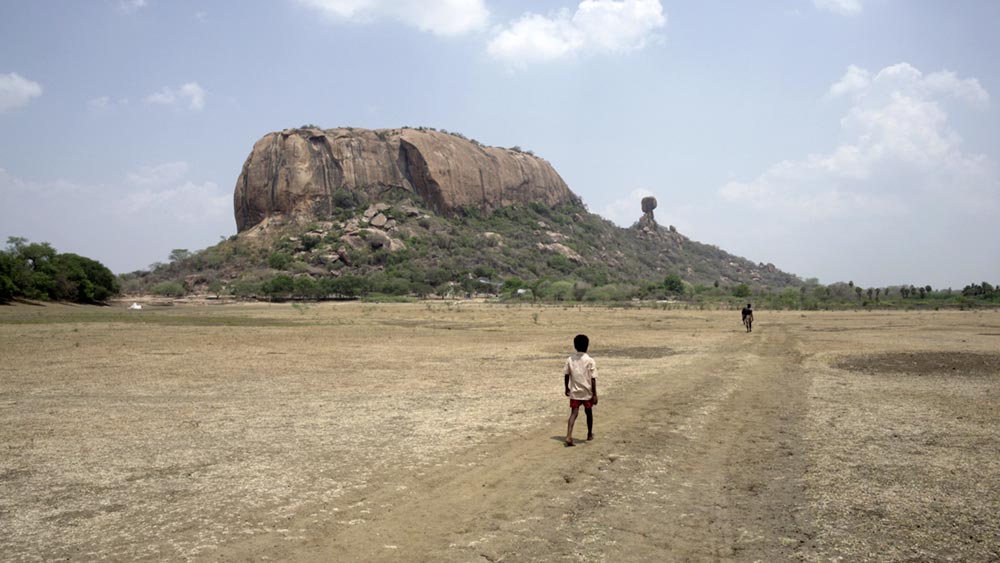
NR: The walking tracking shots are central to the film’s visual style, especially the father. Walking becomes a way to express someone’s personality. Could you talk about shooting these scenes?
PSV: When I completed the script, there were just 13 places where dialogue was required. So I was very much focused on the visual narrative. I was convinced that it had to be communicated visually in a strong way so that the exact emotions could be communicated to the audience who watches it. As soon as I visited those landscapes, I believed that the landscape gave me the visual style for the film. It presented to me how the staging had to be done, how the walk had to be, and how things had to be captured. With the walk especially, I wanted to move the camera when the character walks and stop the camera when the character stops. I didn’t want to be just capturing someone and they’re just walking. I wanted the audience to be a part of the script and be a part of the landscape — to feel the landscape, feel the rage of the sun, the emotions the father character feels in the film. That is why I move the camera in such a way that the audience has to feel it. Now with the response the film has been receiving from audiences, I’m happy that they’re able to feel and see the reason I moved the camera. Some people said they felt part of that landscape and they walked along with the father character. The landscape gave me everything.
NR: You also have great performers. The actor who plays the father comes from theater. Did you work with him on crafting this purposeful walk?
PSV: The people who live in these terrains and landscapes are really dependent on farming, but then because of the drought, some men started to go work as loadmen in markets. As they started working as loadmen, their walking style changed. Most of them have that kind of a walking style. I was able to communicate it easily to the actor. The actor also spent a considerable amount of time observing the way of walking, and he tried to do the loading and stuff for a week or so. So that is how he was able to get that walk. And it is one reason the local audience is able to relate to the father character.
NR: The film is so visually assured but I also admired the dialogue: for example, the conversation between two young women who are walking to market in the village where the boy’s mother lives. They have a wonderful exchange that is a whole movie in itself; they are “writing” characters in how they talk about people. Could you talk about writing such dialogue and your inspirations?
PSV: These dialogues are ones that are often spoken by these people so I picked up the dialogue and placed it in the script. One interesting fact I would like to say is that the two women who are walking in that single shot are my sisters. Their dialogue is what I listened to as a kid — that particular dialogue was spoken by my sisters, and I made them to act and say the same dialogue in the film! And I placed the dialogues where people normally speak.
NR: You toured with Murugu Boopathy’s postmodern theater company. Could you talk about how your experience influenced the film? How did you adapt what you learned on a theater set to this wide-open landscape?
PSV: The theater where I worked was called Manal Magudi [in Tamil Nadu]. While I was working there, I observed that they occupied the entire space on stage. The positioning on stage and the staging for every sequence was very much inspirational for me on this film. And I watched the way the director of the troupe brought out the emotions of the actors, the way he communicated with the actors. There was limited dialogue and he was able to extract emotions through the performances of the actors through their body language and actions. This heavily influenced me in building up the father and the son characters. I also learned a lot about the staging of sequences. Though that was happening in a single space at the theater, it helped me while working and staging in this larger format.
NR: The dynamics between the father and son are very intense. It gets violent but the son is able to hold his ground. Could you talk about shooting those scenes and guiding the boy through those scenes? He gives an expert performance.
PSV: I auditioned about 70-odd kids but I wasn’t convinced by them. So I fine-tuned my search by identifying families that were similar to the ones in the script: father characters and small kids. That’s how I found this boy [Chellapandi]. In real life, his life is much worse than what is there in the script. So I believed he would be able to act more exactly what I was thinking. When I brought him on board and started conveying everything to him, it was very casual for him. He was able to adapt to everything and understand everything, because that is his daily ordeal. How he would behave with his real father is what he has shown on screen. How his father has behaved is in the father character too. So that made things easier for me, because I didn’t need to explain everything in detail as to how he has to react because the boy was naturally emoting everything as soon as the scene was conveyed to him. In a way the boy felt happy because he was able to take revenge on his father through making him walk and playing with the mirror, [reflecting light] on the back of the father. Such things actually made him feel happier because he was able to take some revenge that he couldn’t do in real life. It was quite enjoyable for him.
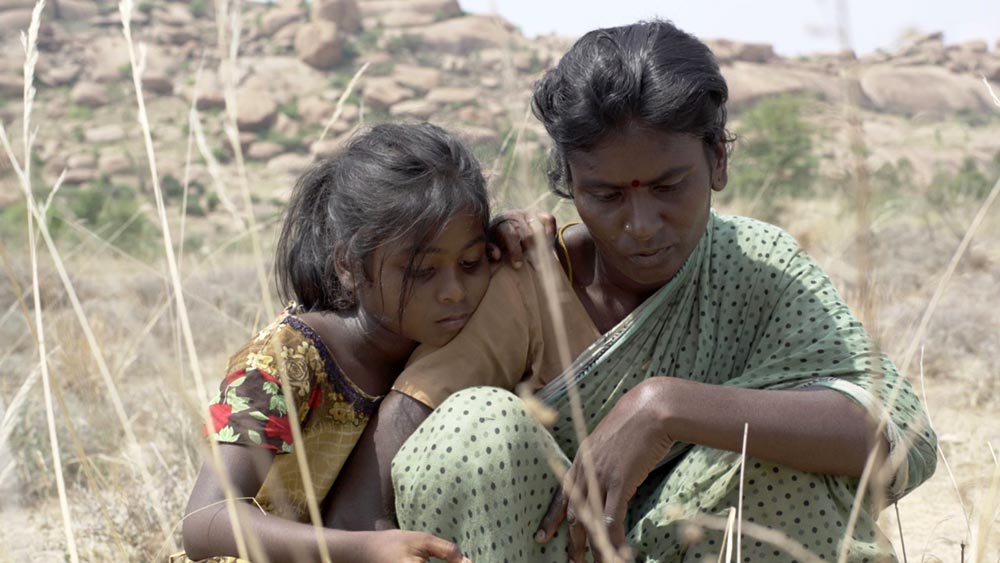
NR: The women in the movie are always working, and life itself depends upon them. As you show how vital they are, did you view this movie as a feminist story in a way? I also think of the vanity of the husband who rides behind his wife on a scooter: he lets her drive, but insists on switching and taking the driver’s seat just before they arrive at the next village.
PSV: I am really happy that you are able to understand the exact reason why the husband on the bike spoke that dialogue. The first and foremost thing is that while writing the script, the inspiration was from my own sister. I worried that because it happened to my own sister and the pain is in her own life, it could feel like I was trying to get sympathy out of it. But then when I went ahead and started working on it, it was not the story of my sister alone — it was the story of all the people in these villages. When I traveled through those villages, the women were working constantly, taking care of the kids, carrying the water on their heads, carrying the wooden logs — all the time, they’re always with the bottles on top of their heads. This made me feel that without women, this land won’t survive, and this people won’t survive. That is the reason I felt that women are very prominent in this film.
After completing the movie, I never thought that it had to be a feminist film or anything to do with feminism. I didn’t want to send out a message through this film, I just wanted to picture the lives these people undergo every day and to convey the emotions and pain these people feel every day. It is the women who are holding the entire family together, having hope that the kids will have a better life. That is what I tried to capture in the film, and the kind of mentality that the male has, like the husband on the scooter who wants to take over driving once anybody might notice. In the end I believed the story was not just happening in South India, it could happen in any country.
NR: Did you show the film to the people from the village?
PSV: I wanted to show them the film because I believed if the emotions were conveyed to these people, it would be conveyed to audiences internationally. So I played the film for them, and it was so funny and so emotional as well because everybody could relate to the incidents happening and to the emotions in the film. Also, the old women started making a light commentary on the characters: they started abusing the father character — “See the way in which he behaves!” And at the end, when he was dumping out the food to eat, they said, “He was beating her so much, and at the end of the day, he has to eat the food like that?!” People were very emotional because it spoke about their lives which often go unnoticed in mainstream cinema. And their comments are the best critique I have received.
NR: Do you feel a connection to any particular filmmakers or traditions in cinema?
PSV: I used to work in a DVD shop, and I saw a lot of movies, all classic Indian films, made by big directors. I remember the visuals and the emotions of all the films. So probably that had an influence. There isn’t one particular film or filmmaker I was able to connect with. But I believe every film and filmmaker has been able to connect to the growth and learning I have had.
NR: At one point the boy in the film puts a pebble in his mouth, and later we see a pile of pebbles in a house. I imagined that the boy must have made this kind of long walk many times. Could you talk about the significance of the pebbles?
PSV: What you have said is right and I’m glad you are able to pinpoint it. The main purpose for which people put pebbles in their mouths is that when you have a pebble in your mouth, you salivate, and it actually satisfies your thirst. So people traveling for long distances often have pebbles in their mouths because they won’t feel their thirst at all until the end of their journey. These kids in the villages often do it when they go for a walk, while they play and stuff. This is something I observed from childhood. About the pile of the pebbles, it could also be that his mother did that walk in hot weather from that village to this village. And in terms of the kid’s life, it’s just another day of his life. In this film, I have just presented a portion of the boy’s life, and not the life prior to it and not the life after it.
NR: What do you want to do next? Do you have a screenplay written?
PSV: [Laughs] Right now I am just sitting idle and relaxing, without thinking anything. The journey has been close to three-and-a-half years. With the response to the film, I am just enjoying it and taking it in, and feeling happy that I have done something good in my life.
